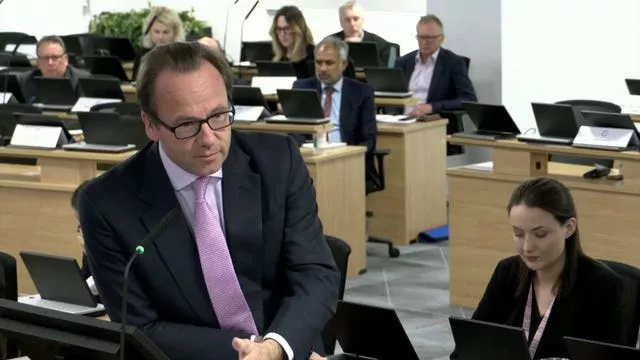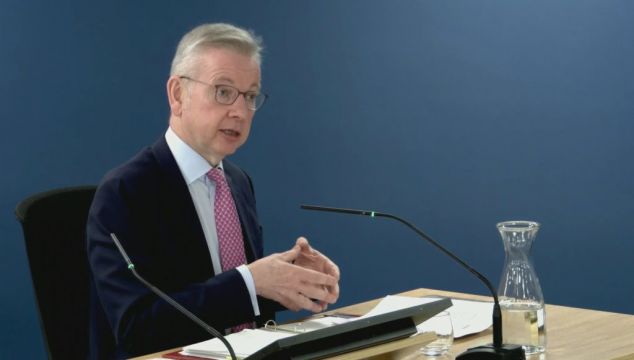UK minister Michael Gove was slapped down at the UK's official inquiry into the Covid-19 pandemic when he suggested there is a “significant body of judgment” that believes the virus was “man-made”.
TheUK levelling up secretary went further than any Cabinet minister so far in questioning the virus’s origins – still a matter of intense scientific debate – as he explained the challenges faced by the UK government as the crisis unfolded in 2020.
Asked about shortcomings in preparedness for a new virus, the senior Tory said: “There is a significant body of judgment that believes that the virus itself was man-made, and that presents challenges as well.”

He was quickly cut off by Hugo Keith KC, lead counsel to the inquiry, who said the “divisive” issue is not part of the inquiry’s terms of reference.
“We’re not going to go there,” he said.
Mr Gove replied that it is “important to recognise that the virus presented a series of new challenges that required … the science to adjust”.
Covid-19’s origins are still being examined nearly four years after the first cases emerged in Wuhan in China.
Some believe the virus accidentally leaked from a laboratory in the city which was looking into similar viruses. But many scientists say the weight of evidence suggests a natural origin – the virus spreading from animals to humans via Wuhan’s wet food markets – is the most likely scenario.
Downing Street said the UK government’s position is for the World Health Organisation (WHO) to investigate the genesis of the virus.
UK prime minister Rishi Sunak’s official spokesperson said: “The government’s view is that the WHO needs to continue to examine all possibilities.
“We think there is still work to be done. But it is for the WHO to investigate.”
It is the “long-standing position of the government” that it is for the WHO to “consider all possible avenues and to come to a conclusion”.
The spokesperson acknowledged it is not a secret that “people have differing views about the origins of Covid-19”.
The WHO’s first origins study in China in early 2021 was inconclusive, with difficulties in collaborating with Beijing cited as part of the reason.
Scientists offered their assessment after Mr Gove waded into the debate.
Professor James Wood, infectious disease epidemiologist at the University of Cambridge, said: “There is strong evidence from virus genomics that the Covid-19 virus was not artificially engineered, or made by humans, but likely arose from another virus infecting wildlife.”
He said epidemiology can only identify where cases are first transmitting – which appeared to be around the Hunan seafood market – not where the first case may have occurred.
“With current knowledge, it is clear that some species of animal, e.g. ferrets and other mustelids, may be easily infected by infected humans in close contact. So animals in the market could have been the route of transmission to animals or could have been infected by humans.
“Genomics cannot however distinguish whether the virus transmitted to humans via traded wildlife in the Hunan seafood market or through a laboratory accident, where a laboratory worker was inadvertently infected from a sample they were processing, subsequently infecting other people. A lab leak is not the same as the leak of a ‘man-made’ virus, but is frequently confused.”
He added that it may never be possible to know with confidence how the Covid-19 virus passed to humans.
Professor Alice Hughes, from the University of Hong Kong’s School of Biological Sciences, said: “There may be a body of judgment, but sadly this has come from a political and not a scientific basis…
“There is no data to support a man-made origin, whilst the infections of mink and other wildlife highlight the ability of the virus to jump between hosts, and similar viruses circulating in wildlife highlight that, like the majority of viruses, Covid is almost certain to have a natural origin.”







